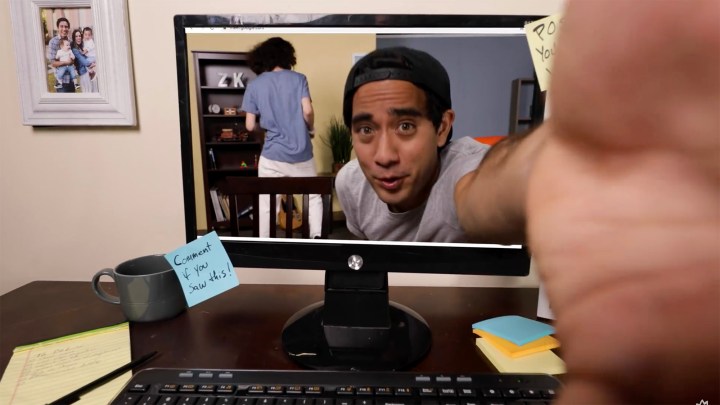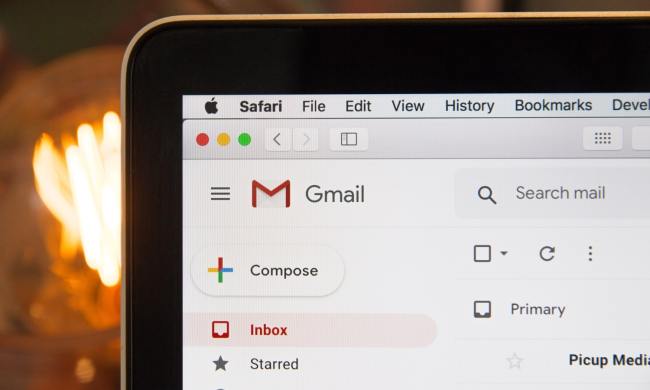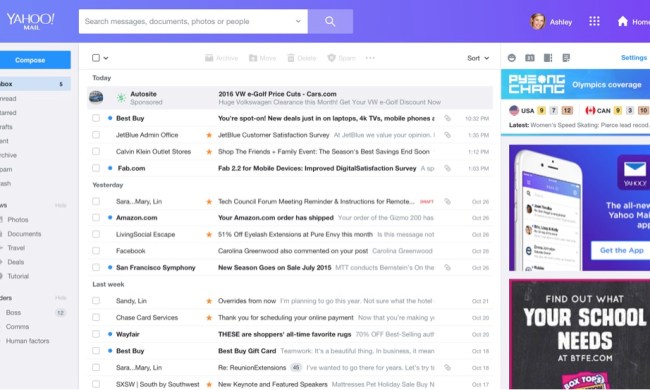
With over 75 million followers across social media platforms, viral magician and filmmaker Zach King isn’t worried about growth so much. He’s more concerned with keeping his audience entertained than watching his follower count.
King has wanted to be a filmmaker ever since he was a kid. He would obsess over movies from directors George Lucas, Steven Spielberg, and Peter Jackson. When VHS tapes started including behind-the-scenes features, King would stay up all night watching, and re-watching, what exactly went on during the filmmaking process: The special effects, the cinematography, the high-tech gear. He dreamed that one day his films would be shown on the big screen, too.
“I had this realization a few years ago that even though I may never be able to make a movie for the theater, the silver screen might not be a thing for me,” he said. “But I am making movies for the little screen now, for millions of devices. It’s cool because, in a way, I hit that dream.”
@zachking They rejected my application to Hogwarts but I still found a way to be a wizard. ????#illusion #magic #harrypotter
King got his start on YouTube in 2011, but blew up on Vine, the six-second video app many call the precursor to TikTok. He credits a lot of his success to the app but has been able to successfully build up his audiences across social media. There was a time when creators only had one platform they excelled at — like being a YouTuber or Instagram influencer — but King has managed to become a pioneer at being one of the top creators on every platform, old and new.
It’s rare to come across a video of King’s that doesn’t have a couple hundred thousand views — or millions. He still has the most-watched and most-liked video of all time on TikTok (2.2 billion).
At his core, King is an illusionist, but one that isn’t too keen on keeping the illusions all to himself. What makes King different from other magicians, online and off, is that he gives his viewers a peek inside how the magic is created — the props, the mirrors, the set design, the camera work, and the software.
Digital Trends spoke to King about his decade-long career, how he finds inspiration, and the ever-changing nature of social media.
The interview has been edited and condensed for clarity.

You’ve had a lot of success with a variety of platforms, from Vine to YouTube, and now TikTok. How have you been able to straddle all of these different content formats?
It’s fascinating because part of the business now is to be on all the main platforms. In the past, with Vine especially not having a long shelf life, you have to be diversified as a creator as part of the business. You still have your own style and voice and branding throughout all of your content, and your audience will get to know you and come to expect what you create and what your voice and tone is. But you do shift your voice a little bit with the type of storytelling on those platforms. The fun is in figuring it out.
When I joined TikTok years ago, it was actually called Musical.ly, but there was still a really large community on there, and they still had the main feature which was mixing your videos with music. Originally, it was a lot of dancing, a lot of lip-syncing. But I like to get on platforms really early before they get incredibly popular, just to figure out if there’s a community growing there, to figure out what I like about it, creatively if it is sparking any new ideas.
When it officially changed to TikTok, I found the hashtag trends to be really inspiring. It was like being given a sandbox of limitations. Some creators don’t like limitations, they don’t want to play in the sandbox, they want to be out in the ocean, but I like having those rules because it guides me.
Many of your videos require a lot of people to be present. What has that been like during the pandemic?
Filmmaking during the pandemic has been tough, and really expensive. When things shut down, we had to go home and you’ll notice my content turned to a lot of my family. A lot of my videos were with my kids and my wife. I did some family content, which I hadn’t done in a long time.
It shouldn’t take a pandemic for you to be grateful, but I was incredibly grateful after getting back to work with my team. I get all the credit for these videos, but I have a team of 25 people on my staff who help me make them. From the writing team to the production team and the post [production] team. The day we closed down the studio for the pandemic, I loaded my car with tons of stands, cameras, and tripods, and for a couple of months, I was shooting by myself. I realized it is a lot of work to get a video made. It’s been 10 years since I really shot alone.
Now with production picking back up, we are starting to shoot again and with COVID-19 guidelines, it’s expensive. The tough part is figuring out how to budget these things, because you have COVID compliance officers there, you have to get the whole crew tested before and sometimes after, so it gets really costly.
You said you have a team of 25 people. How do you all come up with ideas? What’s the creative process like?
We have a formal writer’s room on Monday where we pitch the concept, and they go through a two-week process to get made, sometimes longer if it’s more complicated. But usually what we do is follow curiosity. Last week, I was fascinated with my kids’ sandbox, and I was like, “What if I could go inside like it was quicksand?” Like I was cleaning out their sandbox with them and pretended it was quicksand but it really turned into quicksand and I sank really deep into it. We’ll move it then to the trick engineers and talk about how we physically do that. Most people would pop up a green screen and animate the person falling into the sand and add a dust particle at the end. But our videos are very practical. Part of the magic is when you watch them, you know there’s something real about it. No one thinks the magic is completely real, people know there is some trickery going on, but there’s an aesthetic to it that feels real.

For the quicksand one, we built an 8-foot hole below the sandbox and used this rubber material that would collapse when I stepped on it, and let me through the hole, but then shut back again and held the sand when I was done.
Ideation is a big thing for us. And creatives are a little more in tune with their emotions. But we built a language with our team where when we are whittling down the idea, we aren’t whittling down the person. Everyone knows we are trying to get the very best idea.
As someone who also spends a lot of time on multiple social media platforms for a living, what is your attention span like? Do you feel like social media has made it difficult for you to focus on long-term projects?
My attention span has always been all over the place. I’ve always not been able to focus and sit down and read a book. I feel like I haven’t been able to focus my whole life. I was homeschooled, and my mom could tell you I was the worst student. I don’t attribute that to social media. I’ve done fasting from social media and I still found it’s my human nature to be distracted.
“Where I’m going, I don’t need roads!” pic.twitter.com/6KXaosmAvp
— Zach King (@zachking) October 31, 2020
I do a lot of things now that are really intentional to fight that. When I am in my office, I have my phone outside on the charger on airplane mode and set an alarm for my next appointment. I try not to write using Google Docs — that’s the second draft of it. The first draft is always in a notebook or a text edit software without access to the internet, because for me I know my distractions. If I have a tab open, all of a sudden I’ll be like “How did I get to YouTube?”
The shelf life for internet trends is incredibly small these days, sometimes only lasting a few days. How do you keep up and how do you stay ahead?
In my philosophy of creating, we don’t do a lot of trends. We’ll maybe do three or four a year that we think are going to last, but that’s been hard to judge. There was a trend last week we wanted to jump on, and I feel like it died within three, four hours. Like the same day. That just happens now. Because our videos take a good amount of time, we know if we’re committing to a trend, it’s going to probably take a week to maybe three weeks to get that video out. So we are banking on trends that are still going to be there, and trends that are also evergreen, or that the video still makes sense without knowing what the trend is.

I’m nervous for creators that only hop on trends, and it’s fine to get growth once in a while from a trend, but if that’s the only thing you do, it’s not going to be sustainable. The trends are getting quicker and quicker and you have to be faster, and with that speed, the quality of your work, and even your jokes and the comedy, can only be so good.
We’ve decided that we are going to make two videos a week, no matter how good they are, we’re going to make two no matter what. That allows us to stay up with that creative muscle, and to stay on our A-game.



